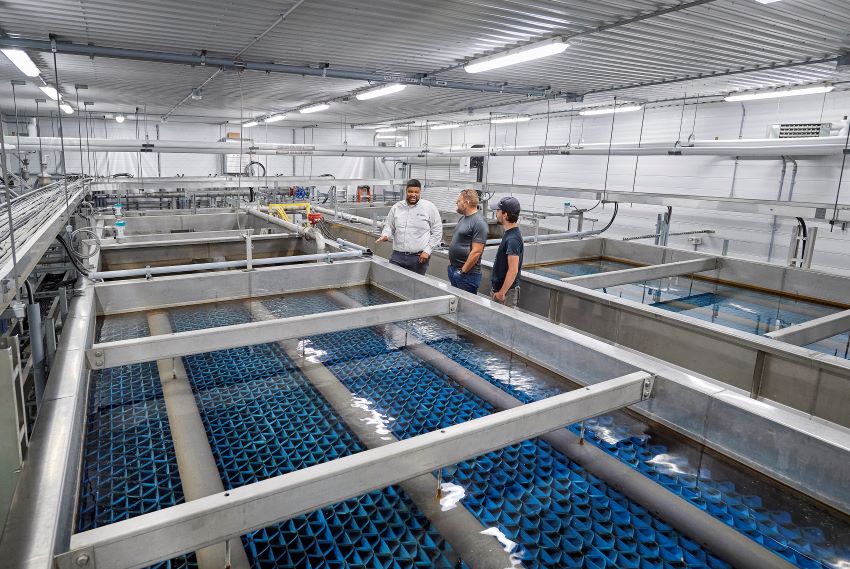In recent issues, Water Canada has outlined many of the challenges operators face keeping systems up and running, often under difficult conditions and for pay barely exceeding minimum wage. Systems frequently operate on threadbare budgets, and some communities have endured boil water advisories for decades as band councils juggle multiple, equally urgent priorities.
As part of Water Canada’s ongoing series, please see:
A closer look at Canada’s water operator shortage
Zhiibaahaasing operator’s drive for safe drinking water
The Atlantic First Nations Water Authority
A position paper by the Ontario First Nations Technical Services Corporation, an organization that trains and guides First Nations water and wastewater personnel across Ontario, makes it clear that the current model isn’t working and calls for decision-making for those services to be squarely in the hands of the Indigenous communities they serve. “Decolonizing the water governance apparatus that continues to fail Ontario First Nations is long overdue…No longer can First Nations tolerate the status quo that, under Canada’s watch, perpetuates oppression and denies fundamental Indigenous and human rights.”
The 22-page paper, Decolonizing Water Governance: Addressing the Water Crisis in Ontario Through Recognition of First Nations Jurisdiction, says Indigenous communities must determine their own water and wastewater-related governance structures without outside interference but with the support of colonial governments in keeping with Canada’s obligations under the United Nations Declaration on the Rights of Indigenous Peoples (UNDRIP).
Adopted by the UN General Assembly in 2007, UNDRIP identifies minimum standards for human rights and fundamental freedoms for Indigenous people and communities globally. Although Canada, the United States, Australia, and New Zealand initially voted against UNDRIP, they later reversed course to adopt a document that has, in many respects, helped drive challenges to colonialism and its often damaging legacies with a view of promoting the wellbeing, dignity, and survival of Indigenous people and cultures.
In Decolonizing Water Governance, the OFNTSC proposes a two-pronged approach to decolonizing water governance in Ontario. The first puts forward short- to medium-term reforms that would fill regulatory gaps, end boil water advisories, and increase funding for training, operations and maintenance, and infrastructure. The second looks to restore jurisdiction so that the management of systems aligns with Indigenous knowledge, customs, traditions, and self-determination.
“Contrary to what federal policy would suggest, the water crisis is not a project management issue: it is an Indigenous rights, human rights, and sustainability issue,” the paper articulates. “For decades, the government has invested money to address this issue, yet the crisis persists. It is clear that the status quo must be abandoned.”
The paper acknowledges that the OFNTSC is not a rights-holder and has no mandate to speak on behalf of Ontario First Nations. In fact, the authors point out that their organization is funded by and answers to Indigenous Services Canada (ISC). However, the authors say the OFNTSC’s duty to provide technical services to Ontario First Nations compels it to advocate for a new model and way forward based on self-determination.

More than funding
Defining decolonization as full, sovereign control, the paper remains open-ended about actual remedies for ailing water and wastewater systems. “What the return of jurisdiction looks like remains to be seen,” the authors explain. “It could take the form of a First Nations-led water authority, or perhaps several First Nations-led regional water authorities, or it could take a completely different form. This paper is not designed to be prescriptive but, rather, to catalyze discussions on the importance of water sovereignty, and the need to decolonize existing water management structures and restore First Nations jurisdiction over our water.”
The authors note that, as of 2015, 36 per cent of drinking water advisories in Ontario First Nations had been in effect for more than 10 years, and they attribute this in part to unpredictable and often insufficient funding from ISC to build, operate, maintain, and monitor water and wastewater systems. “The federal government funds a portion of operations and maintenance costs for First Nations’ public water and wastewater systems on reserves, leaving a standard 20 percent deficit for the First Nations to cover. The federal government does not evaluate the ability of First Nations to make up the difference, despite limited community resources.” Furthermore, the authors say, ISC has failed to spend substantial budgeted funds in recent years and hasn’t monitored to see if its investments produce positive outcomes.
The authors chastise the federal government for failing to set targets and for missing key deadlines. “In 2015, Prime Minister Justin Trudeau committed to ending all long-term drinking water advisories by March 2021. When that deadline passed, the government recommitted to ending long-term advisories without a target date.”
In some cases, the authors found basic data unavailable. “In 2003, the federal government’s National Assessment on Water and Wastewater Systems in First Nations Communities highlighted the state of water for First Nations people. At the time, the government report estimated that 13.5 per cent of First Nations had trucked-in water, 13 per cent had individual wells and 1.5 per cent had no water service at all. Attempts to obtain recent statistics on these figures turned out fruitless.”
Decolonizing Water Governance also points to impacts from colonialism, including the forced relocation of many communities to areas where water scarcity, resource extraction, and industrial pollution place additional stress on potable sources. “Financial commitment alone will not solve the water and wastewater crisis on First Nations reserves. Along with infrastructure investments, the government should remedy a range of problems that contribute to the water crisis. These include: the lack of binding regulations on water quality on First Nations reserves; persistent under-funding and arbitrary budgeting for water system costs, including capital, operation, and maintenance costs; lack of support for household water and wastewater systems; worsening conditions of source water; and lack of capacity and support for water operators.”
The Ontario First Nations Technical Services Corporation isn’t alone in advancing the notion of indigenous communities asserting control over and responsibility for their water resources.

First Nations perspective
Invoking UNDRIP’s emphasis on Indigenous political and cultural rights, the paper’s authors introduce a spiritual dimension to their argument, advancing the Anishinabek word nibi to denote the sacred, life-sustaining place water holds in First Nation worldviews, and say a new approach to governance, designed and led by First Nations, would understand water as more than a resource and commodity.
Following the paper’s release, Water Canada spoke with OFNTSC executive director Melanie Debassige and operations director Glen Goodman about the document’s implications and possible next steps. “It’s about decolonizing how water is delivered, and water governance,” Debassige says. “Because, right now, we’re just delivering government programs. It’s not based on our own self-determination.”
Debassige points out the irony that, although Ontario’s standards for drinking water are among the safest in the world and the province itself borders freshwater giants the Great Lakes, a substantial number of Indigenous communities still boil their water and deal with contamination from deadly pollutants. “Something’s not balancing here,” Debassige says, citing mercury poisoning at Grassy Narrows in northwestern Ontario from pulp and paper operations as one example.
Goodman, meanwhile, says he sees the position paper as articulating the need for Indigenous communities to fully manage their own infrastructure, with the OFNTSC continuing to provide technical support to help maintain and enhance operational, supervisory and management expertise at a local level. “Historically, the Government of Canada’s approach is ‘We’ll manage it for you’, so they keep throwing money at the wall,” Goodman says. “But that hasn’t proven to be successful. The approach we’re proposing is that our communities make decisions and take ownership and accountability and understand what that involves, with OFNTSC partnerships and with us providing the training.”
Debassige says decolonization and self-determination also extend to source water protection. “You get into the James Bay Lowlands and the Ring of Fire, and those communities need to be part of the decision-making process. They’ve seen that governments haven’t lived up to their obligations, so they need to be at the table when there’s discussions involving source water protection and potential industrialization through activities such as mining.”
Noting the OFNTSC’s longstanding role in helping train and support operators, Debassige says the organization is incorporating traditional knowledge into its offerings and doing what it can to support and empower First Nations so they can become increasingly technically self-reliant. The organization is also working with the Assembly of First Nations to develop legislation from a First Nations perspective, as well as communicating with provincial and federal government representatives. For example, the OFNTSC has raised the notion of Red Seal standards for water and wastewater system operators so that they would routinely receive a level of training matching other trades. “We’ve talked about that with the province and I’ve brought it up to the Minister,” Debassige says. “We need to have our own training that we certify and that the province supports. Without water operators, people and communities don’t have clean drinking water. It’s the most important job in the community.”
To read OFNTSC’s report in full, visit: https://www.ofntsc.org/news/decolonizing-water-governance-addressing-water-crisis-ontario-through-recognition-first
Saul Chernos is a freelance writer for Water Canada.









